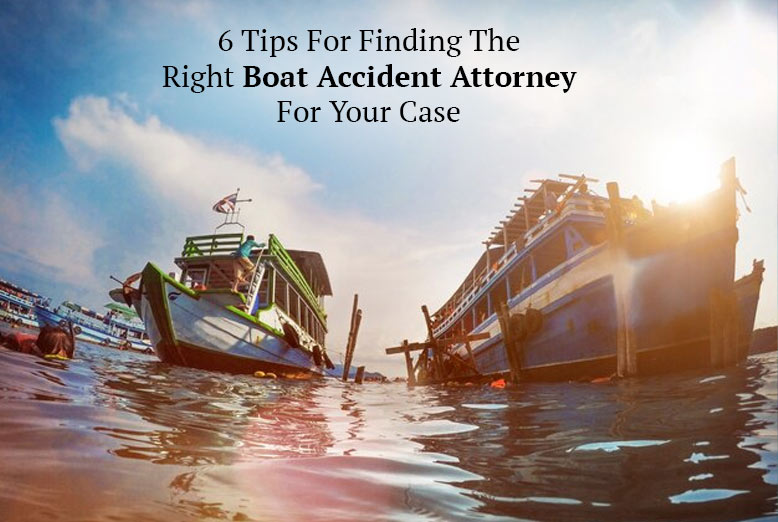Every year, more than 3,000 watercraft accidents occur in the United States, causing significant damage. Approximately 564 of these accidents result in deaths, while 2,126 cause injuries.
So, if you have recently been injured in a boat accident, contact a boat accident attorney.
A boat accident attorney can help you fight for compensation. Otherwise, you would have to cover your losses out of pocket.
Don’t know which boat accident attorney to hire?
Here are six tips for choosing the finest boat accident attorney.
1. Seek Specialized Experience in Maritime Law
Maritime laws govern the insurance claims related to boat and ship accidents filed by ship owners, seamen, and passengers. Thus, if you are also among them, you need an attorney with expertise in Maritime law. Such expertise will help you navigate the complicated maritime laws easily and strengthen your claim.
However, many individuals make the mistake of working with any personal injury lawyer when filing a claim for boat accidents. This eventually leads to financial losses and defeat in the case.
Thus, to avoid financial loss and solidify your claim, you must work with attorneys who handle boat accidents .
Why it matters?
A person with maritime expertise is in a better position to identify liable parties, including boat operators, manufacturers or event organizers. Furthermore, they can also explain the maritime statutes, such as the Jones Act or the Longshore and Harbor Workers’ Compensation Act, to make sure that your rights are accounted for.
What to look for?
- Previous cases involving boating accidents.
- Familiarity with Coast Guard regulations.
- Testimonials or case results reflecting their expertise.
2. Evaluate Their Track Record
The outcome of your case hinges on a successful record of attorney in other cases. A strong track record indicates that attorneys can negotiate, get to work gathering evidence, and, if needed, make a good case in court.
Questions to ask:
- How many boat accident cases have you handled?
- What were the outcomes of these cases?
- Have you dealt with cases involving accidents similar to mine?
A positive indicator of success is having a high success rate in getting favorable verdicts or settlements. This information can be usually found on the attorney’s website, or you can get the necessary information during a consultation.
3. Assess Their Communication Skills
A smooth attorney-client relationship relies on effective communication. You should get an open, honest and transparent lawyer who will constantly inform you about how your case is progressing and clarify legal jargon.
Red flags to avoid:
- Delays in returning calls or emails.
- Vague or unclear answers to your questions.
- Lack of a clear strategy for your case.
A good boat accident attorney will care about you as a person and respect your feelings. When you first meet with them, focus on if they listen to you and how they outline a plan of action.
4. Check for Transparent Fee Structure
It is usual that after the cases are resolved, clients are surprised by the additional fees charged by their lawyers. This happens due to unclear fee structures and the negligence of individuals.
Thus, to eliminate such surprises later, you should ask your lawyer about their fee structure and whether there are no hidden charges.
Key points to clarify:
- How much of the settlement or award will the attorney receive?
- What are the other costs, such as court fees or experts’ fees?
- What will happen to expenses if the case fails?
All in all, if you ensure that the boat accident attorney offers a clear fee structure, you will surely eliminate unnecessary expenses.
5. Read Reviews and Seek Referrals
You already know that checking reviews is the best way to ensure the capability and professionalism of anyone, including boat accident attorneys.
Reviews should mention if the lawyer was responsive and if they were successful in the cases they handled.
Steps to take:
- Check platforms like Google Reviews, Avvo, or legal forums for feedback.
- Ask friends, family, or colleagues if they have recommendations.
- Request client references from the attorney directly, if possible.
Personal testaments can be very well-rounded and give you a much better idea of what you’re getting yourself into.
6. Ensure They Have Trial Experience
Most boat accident cases are resolved through settlements, but some may require going to trial.
So, having a lawyer with courtroom experience means you have someone knowledgeable if your case does escalate. Attorneys know how to make strong arguments in an efficient manner, ask tough questions to witnesses, and convince a jury to understand how much your damages are.
Why is this important?
An attorney who is confident in the trial aspects will generate more respect during the settlement than one who is not. It is more likely for opposition parties to agree to fair terms if your lawyer is ready to go to court.
What to ask:
- How many of your cases have gone to trial?
- What were the outcomes?
- Are you comfortable presenting complex maritime law to a jury?
By picking an attorney who has experience in the courtroom, you get yourself a stronger advocate, whether it’s in or out of court.
Bottom Line
Selecting the right boat accident attorney is a critical step in ensuring you receive the compensation you deserve. By prioritizing expertise in maritime law, evaluating their track record, and considering their communication skills and fee structures, you can find an attorney who will advocate effectively on your behalf.Just remember to act quickly. Even evidence can disappear, and legal deadlines, called statutes of limitations, may bar you from filing a claim.
Also Read: Can I Trust a Claims Adjuster? And Other Questions an Accident Victim Might Have






















